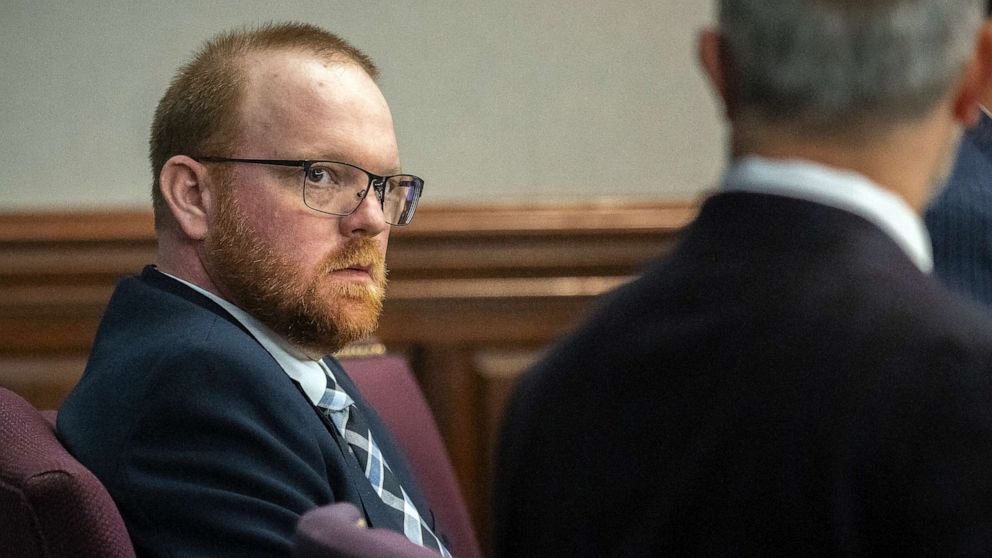Key takeaways from 1st day of trial of men charged in Ahmaud Arbery killing
The first day in the murder trial of three white Georgia men accused of chasing down and killing Ahmaud Arbery ended with the jury being shown police body-camera footage of the 25-year-old Black man lying dead in the middle of a road, his lifeless eyes fixed and his body covered in blood.
The graphic images were the last piece of prosecution evidence the Glynn County, Georgia, Superior Court jury was shown before the panel was dismissed for the weekend.
The body-camera video was taken by Officer William Duggan of the Glynn County Police Department, who testified that when he arrived on the scene on Feb. 23, 2020, Arbery was already dead.
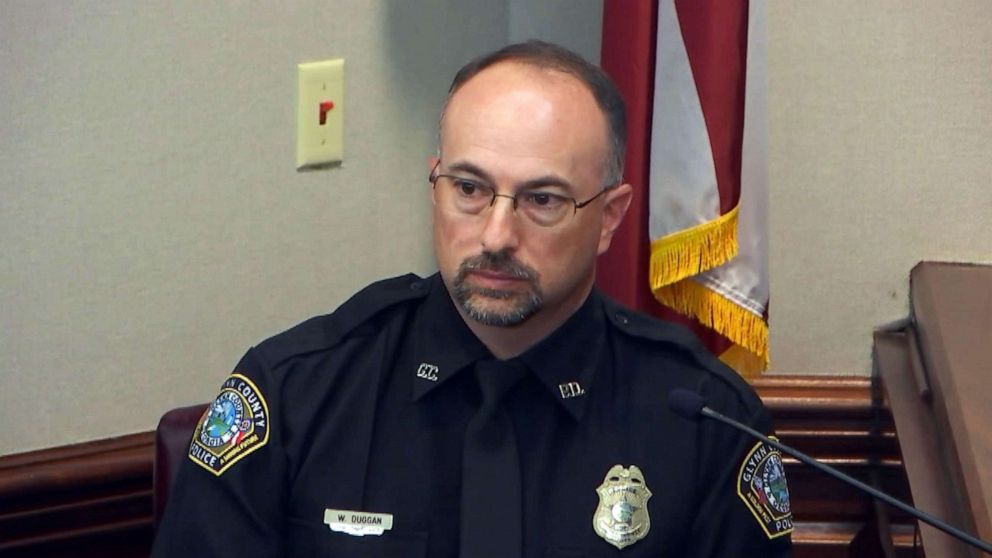
"The amount of blood loss I observed at the scene and the lack of rise and fall of the chest, and the gaping wound on the side of his chest ... there was nothing I could do for him," said Duggan, the first witness the prosecution called in the case.
Duggan was the only witness called to testify on Friday before court recessed for the weekend.
'Assumptions and driveway decisions'
The three defendants are Gregory McMichael, 65, a retired police officer; his son, Travis McMichael, 35; and their neighbor, William "Roddie" Bryan, 52.
The men have pleaded not guilty to charges of murder, aggravated assault and criminal attempt to commit false imprisonment.
They have also pleaded not guilty to the federal hate crime charges they were indicted for in April.
Linda Dunikoski, the lead prosecutor in the case, was called on first to give her opening statement. She started her 95-minute statement by telling the jurors why they were there.
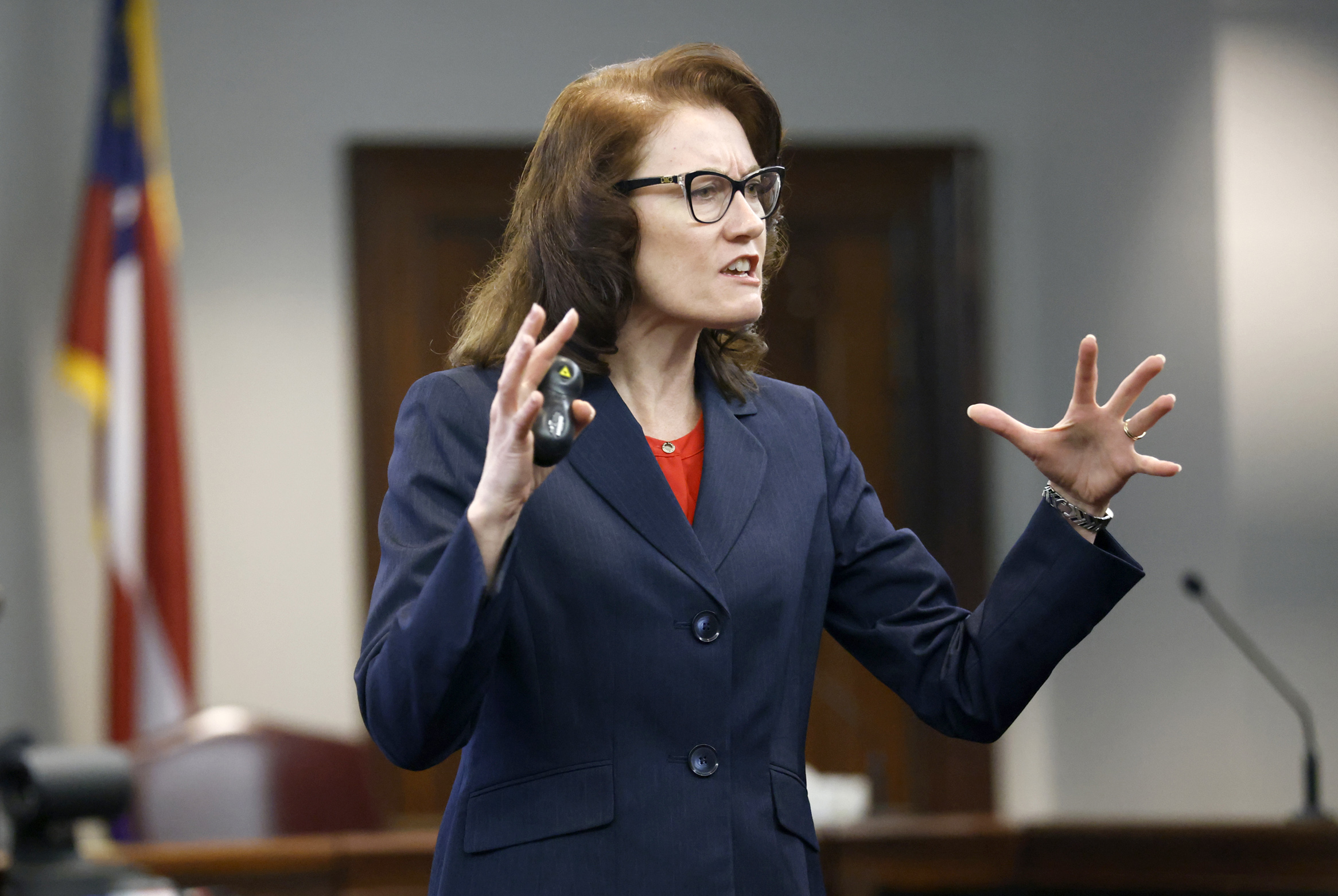
"We are here because of assumptions and driveway decisions," Dunikoski said. "A very wise person once said, 'Do not assume the worst of another person's intentions until you actually know what's going on with them.'"
Dunikoski went on, "And in this case, all three of these defendants did everything that they did based on assumptions. And they made decisions in their driveways based on assumptions that took a young man's life and that's why we are here."
Dunikoski said the evidence will show that the defendants wrongly assumed Arbery was burglarizing a home under construction in their neighborhood.
The prosecutor played multiple videos of Arbery inside the unfinished home dating back to Oct. 25, 2019, to show that Arbery had a routine of running through the Satilla Shores neighborhood where the defendants lived. But Dunikoski said none of the videos showed Arbery stealing or damaging anything.
Dunikoski methodically went through the events of Feb. 23, 2020, the day Arbery was killed.
She said it started around 1 p.m. when Gregory McMichael saw Arbery run past his home and allegedly assumed Arbery was a burglar seen in security videos he had been shown by a neighbor. Dunikoski said at no time did Gregory McMichael ever see Arbery at the house under construction or have any reason to believe Arbery had committed a felony, grounds for making a citizens' arrest.
Dunikoski said Gregory McMichael ran into his home, armed himself with a handgun and got his son, Travis. She said Travis armed himself with a Remington 12-gauge pump-action shotgun and that he and his father got into his pickup truck and chased after Arbery.
She said that Bryan joined the chase with his pickup truck, not knowing why the McMichaels were pursuing Arbery. Dunikoski said that during the five-minute chase, Bryan attempted to strike Arbery with his pickup on four different occasions and admitted to running Arbery off the road and into a ditch.
'Trapped like a rat'
Dunikoski played a cellphone video that was taken by Bryan showing the moment Arbery was cornered between the McMichaels' pickup and Bryan's truck and when Travis McMichael got out of his vehicle and shot Arbery. She alleged that Gregory McMichael would later tell police that he and the other two men had Arbery "trapped like a rat."
As the video was played, Arbery's mother, Wanda Cooper-Jones, who was sitting at the rear of the courtroom, broke down in tears.
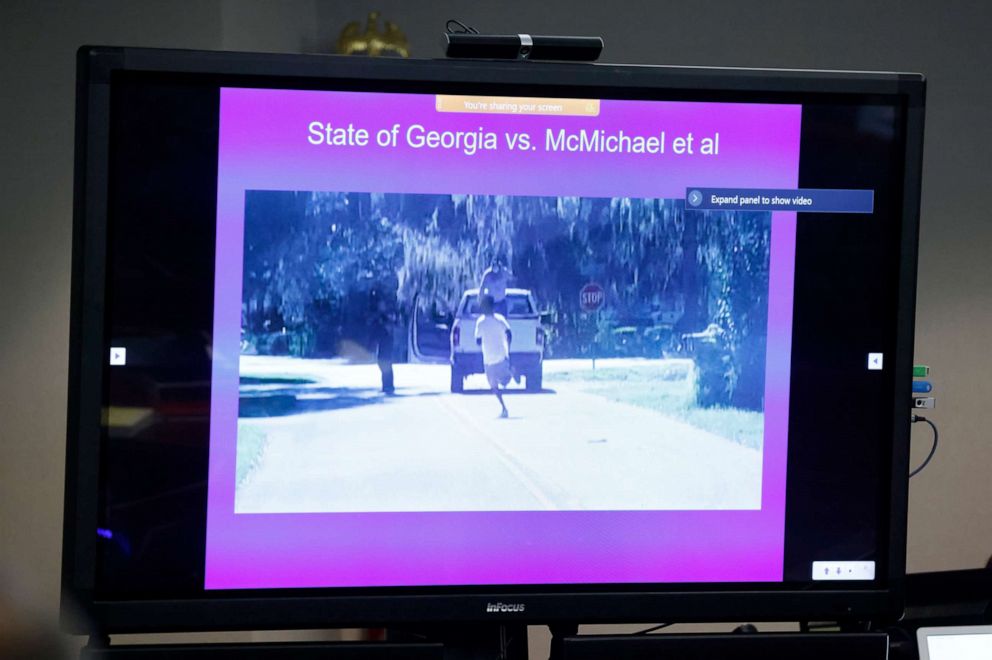
Dunikoski also played a 911 call Gregory McMichael made at 1:14 p.m. and described an emergency: "I'm here in Satilla Shores. A Black male is running down the street."
"This was an attack on Mr. Arbery for five minutes and the only thing Mr. Arbery did was try to run away," Dunikoski said.
'Duty and responsibility'
The first defense attorney to give an opening statement was Bob Rubin for Travis McMichael.
"This is about duty and responsibility," Rubin said of the case. "It's about Travis McMichael's duty and responsibility to himself, his family and his neighborhood."
Months before the Arbery killing, the neighborhood of Satilla Shores was "on edge" due to a series of burglaries, Rubin explained.
Rubin claimed that on Feb. 11, 2020, 12 days before the slaying, Travis McMichael had an encounter with Arbery outside the home that was under construction in his neighborhood.
He said the younger McMichael was going to get gas when he saw a Black male dart across his path and start "lurking in the shadows" 20 to 30 feet off the street. Rubin alleged that when Travis McMichael got out of his car and approached, the man, who turned out to be Arbery, reached for something in a waistband leading McMicahel to believe he was reaching for a gun. He said the man ran into the unfinished home, while Travis McMichael went home and called 911.
Travis McMichael was attempting to 'de-escalate': Lawyer
Rubin said that on the day of the shooting, a neighbor saw Arbery go into the house under construction and made eye contact with the man.
He said Arbery bolted from the house. He said Gregory McMichael saw Arbery and recognized him from videos neighbors shared of the unidentified man who had been seen multiple times at the home construction site.
Rubin said the older McMichael went into the house and told his son that the man they had been on alert for just ran by. He said Travis McMichael grabbed his shotgun because he feared the man might be armed because of what occurred in his previous encounter with him.
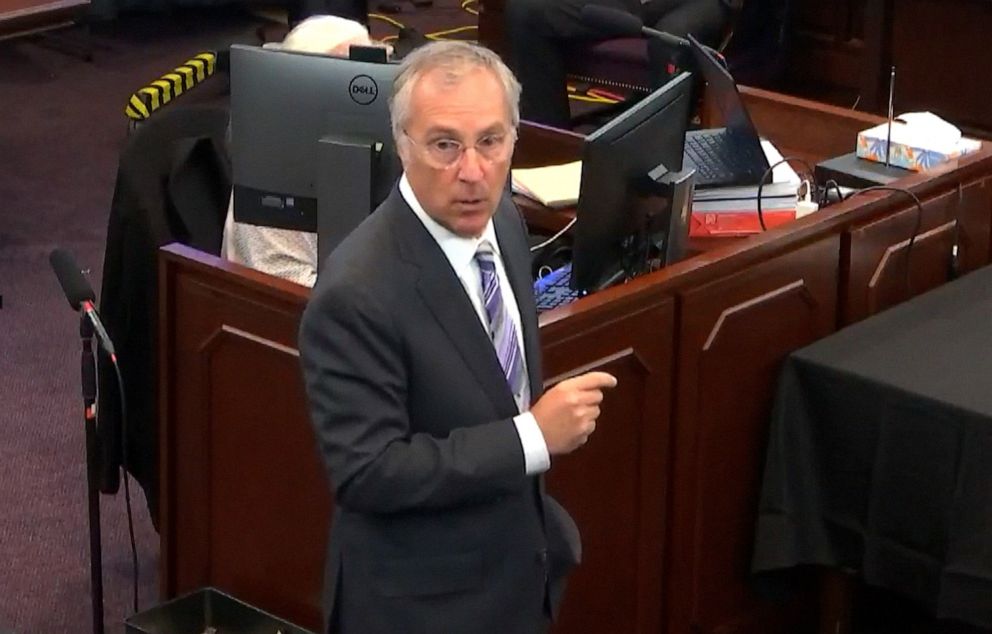
He said that when the McMichaels caught up to Arbery in their truck, Travis McMichael told the man they just wanted to talk to him to find out what he was doing in the neighborhood, but that Arbery said nothing and continued to run.
Rubin said the McMichaels had every right under the state's citizens' arrest law, which has since been repealed, to detain Arbery for the police, adding, "When seconds count, police are often minutes away."
He acknowledged that Travis McMichael parked his truck and got out with his shotgun when he saw Arbery running away from Bryan's truck and back toward him. He said Travis McMichael called 911 on his cellphone and handed it to his father as Arbery charged toward him, ignoring orders to stop.
"Before the first shot is fired they called the police. That is not intent to commit murder," Rubin said.
He said Travis McMichael raised his gun at Arbery from 20 yards away because "that is how you de-escalate violence."
"If he wanted to kill him this is an open shot," Rubin said.
Rubin said Arbery moved to the opposite side of the pickup truck away from Travis McMichael and then came around the front of the truck and lunged at the armed man, trying to take his gun. At that point is when Travis McMichael fired the first of three shots at Arbery.
"It's tragic that Ahmaud Arbery lost his life, but at that point, Travis McMichael is acting in self-defense," Rubin said. "He did not want to encounter Ahmaud Arbery physically. He was only trying to stop him for the police."
'Stop right there'
Franklin Hogue, an attorney for Gregory McMichael, said his client was in the rear bed of his son's pickup on the phone with police and saw Arbery running in his direction away from Bryan's truck.
"Then you hear him yell, 'Stop right there, damn it! Stop,'" Hogue said referring to the recorded 911 call Gregory McMichael was on. "Then the last word you hear was him saying 'Travis.'"
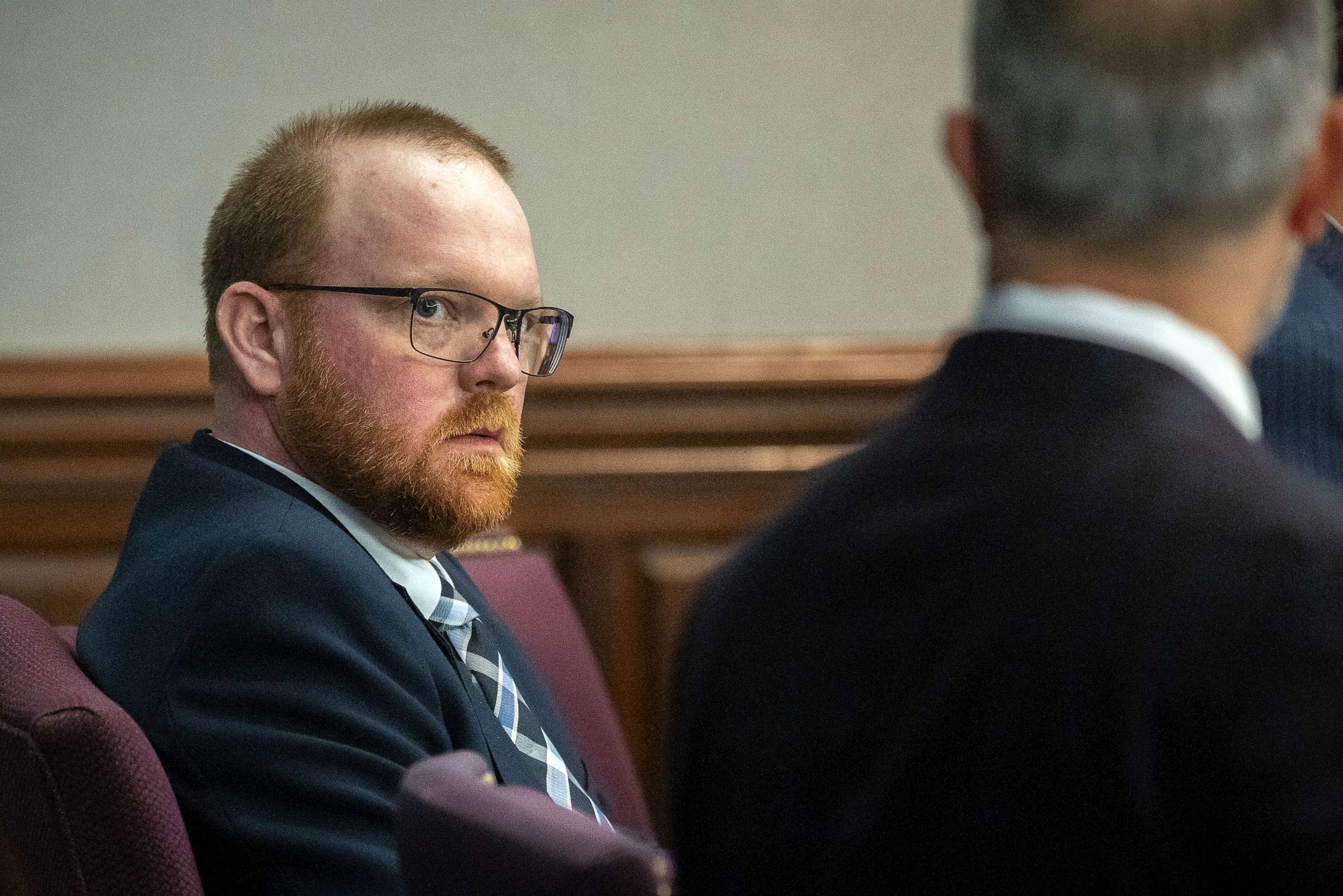
"He's in abject fear that he is about to witness his only son shot and killed in front of his very eyes," Hogue added.
Hogue said that following the shooting, Gregory McMichael had a lengthy interview with police in which he said, "My intention was to stop this guy so he could be arrested or identified."
"The truth of this case is that Greg McMichael is not guilty of any of these crimes," Hogue said.
Bryan's attorney, Kevin Gough, deferred his opening statement until after the prosecution completes its case.
